The project moved forward from the concept of the New European Bauhaus plan and developed an innovative methodology to be used by Vocational Education providers and trainers in decentralized areas to educate learners about sustainable development and social innovation.
![]() .
. ![]()
The Post-Human Architect project created a set of tools dedicated to VET providers in decentralised areas:
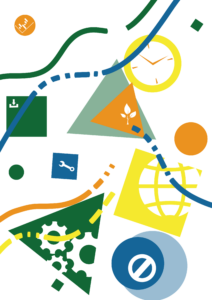
You can use the Guideline for forward looking VET trainers to understand how to use the tools created by the PHA team.
We recommend you have a look at the GOOD PRACTICES CASE STUDY COMPENDIUM, which represents very well what we intend with Post-Human Architecture. When we talk about Architect and Architecture, we think about a person who is strategically planning a change in a location. But this change can influence not only the space, but as well its inhabitants, the community around it, the natural resources connected to it, the technological interactions, and much more.
In the PHA competences framework we have collected the set of skills that a Post-Human Architect should develop. You can use this resource to test your and your students’ skills.
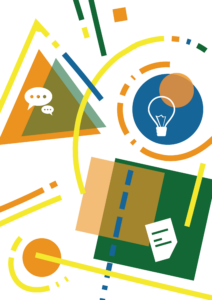
In case you find out that you need to exercise more to develop the right skills to become a Post-Human Architect, have a look at the PHA TRAINING, and use it with your students
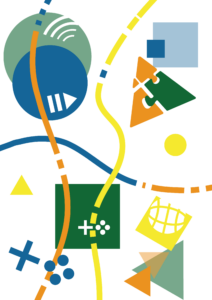
We have prepared for you two educational board games to practice the skills of Post-Human Architect in an informal, interactive and attractive way. Play them with your students. In the following document, you will find the rules and the printable material. Let’s play!
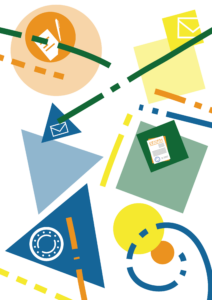
In the end, you can create a certificate, in line with national and European qualification frameworks, for recognition and certification of Post-Human Architect skills. The European Skills Agenda highlights the importance for learners to prove their skills and communicate them when applying for further learning or a job.
Let your students test their level of skills after you propose them the training methodology. Using this link, they will access a test, and in the end they will get a certificate, if they answer correctly to at least 80% of the questions.
![]()
Funded by the European Union. Views and opinions expressed are however those of the
authors only and do not necessarily reflect those of the European Union or the Swedish
National Agency UHR. Neither the European Union nor UHR can be held responsible for them.
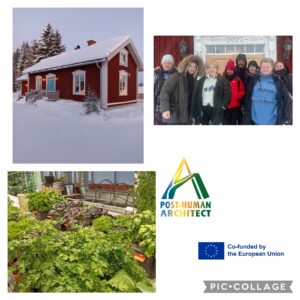 The Post Human Architect project ended in December 2023 with the final meeting in Boden, Sweden. The meeting was hosted by the coordinator, Changemaker Educations, in the rural area at the tourist farm Peetgården and it also included a field visit at the greenhouse heated with the waste heat coming from a data center in Boden.
The Post Human Architect project ended in December 2023 with the final meeting in Boden, Sweden. The meeting was hosted by the coordinator, Changemaker Educations, in the rural area at the tourist farm Peetgården and it also included a field visit at the greenhouse heated with the waste heat coming from a data center in Boden.
During the final meeting, we finalised the certification system developed by IC-Geoss. The system is based upon the PHA Certification Framework, and it provides VET trainers and students with an assessment tool and a certificate.
Read more about it in the Press Release n. 4.
The Post Human Architecture Training Methodology (developed by Sineglossa) revolves around the figure of a “Post Human Architect”. Who is that person? Not an architect in the strict sense, but someone who is capable of interpreting spaces from an ecosystemic perspective and imagining new sustainable approaches, usages and opportunities for those who inhabit them or might inhabit them: architects and designers, but also cultural managers, humanists, artists, and technologists.
Read more about the Post-Human Architect training methodology in the Press Release n. 3, and test it yourself and with your students.
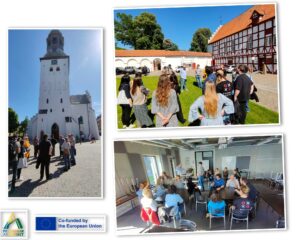 From the 30th of May, to the 1st of June we organised a test session for the two board games developed by the Futuregames’ students in Game design.
From the 30th of May, to the 1st of June we organised a test session for the two board games developed by the Futuregames’ students in Game design.
The event was hosted by the University of Aalborg in Denmark. Students in different disciplines, like architecture, anthropology, social sciences, game development, met and tested the games. During their time in Aalborg, the participants in the activity also got the possibility of exploring the city architecture with a guided tour provided by Utzon Center.
Read more about it in the Press Release n. 2, and download the games: Holistica, and Cards Against the Apocalypse.
Einurd has developed a Competence framework based upon a best practice collection and focus group results in partners countries and with reference to the Post Human Architecture methodology and New European Bauhaus goal and values (EU, 2022).
Starting from the competence framework we are now developing a methodology to teach the future post-human architect how to manage a post-human project.
Read the Press Release n. 1 announcing the publication of the Competence framework
VET trainers, students, and community members coming from decentralised areas participated in the three-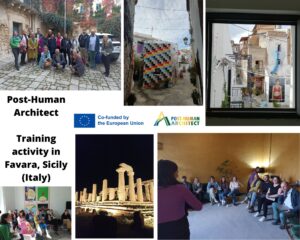 day training activity in Favara, Sicily, hosted by Farm Cultural Park. During the training sessions, we tested the methodology prepared by Sineglossa, exploring the territory, understanding the existing interconnections between the territory, the cultural heritage of the places that we visited, and possible conservative developments.
day training activity in Favara, Sicily, hosted by Farm Cultural Park. During the training sessions, we tested the methodology prepared by Sineglossa, exploring the territory, understanding the existing interconnections between the territory, the cultural heritage of the places that we visited, and possible conservative developments.
The activities done were evaluated by the participants, and thanks to their feedback and comments the methodology will be improved and adapted.
The last session of the meeting was dedicated to the development of the game, which will become a tool to teach the Post-Human architect principles.
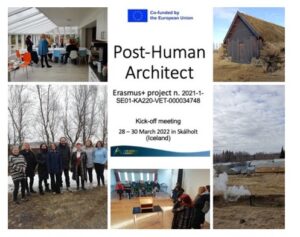
Post Human Architecture involves public participation and integration of culture and community values. The need is always to repopulate a place and make it more attractive to live and work in. Create their own identity and sustainability, the reason for the project must be rooted in the community, history and culture, sometimes you use new technologies, to ensure their independence and participation to enable them to enhance the prosperity of the places. To speak the right language, and attract the right kind of tourists that will appreciate the place.
The project was presented to the community of Skálholt in South Western Iceland. In the meeting participated both long-time community members, newcomers and interested investors. Einurd will follow up on these relations throughout the project with involvement in focus groups and training activities.
Funded by the European Union. Views and opinions expressed are however those of the authors only and do not necessarily reflect those of the European Union or the Swedish National Agency UHR. Neither the European Union nor UHR can be held responsible for them.

Program: Erasmus+
Key Action 2: Partnership for cooperation for VET providers
Start: 01-01-2022 – End: 31-12-2023
Project number: 2021-1-SE01-KA220-VET-000034748
Total budget: 237 025 EUR
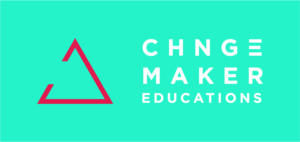
Changemaker Educations has been running education for over 25 years and educated several thousand people within the games, tech and creative industries. We started our journey in Stockholm, Sweden, and today have five hubs in Sweden (Stockholm, Gothenburg, Boden, Skellefteå, Karlstad) and one hub in Norway (Nordreisa). Futuregames is the brand name for our game education,
Our vision is to provide each individual with the competence and the context they need to be able to contribute to sustainable change, for themselves and for society. Our mission is to be a school that provides innovative education that gives people updated skills and tools to solve today’s and tomorrow’s challenges.
Einurð was founded in 2010 and is an organization involved in adult education and community development. Einurð employs experts in management, research, education and training. Einurð collaborators are mostly non-profit organizations including schools and education centers on all levels from preschools to universities as well as organizations and centers of innovation and community development. Einurð operations include: consulting, research, surveys, development of educational resources, equal pay auditing and validation of informal learning, and development of curriculums and training models both face-to-face and distributed or e-learning. Einurð has also provided organizations with trained project managers for local, transnational, long- and short-term projects.
Farm Cultural Park is one of the most influential independent cultural centers of the contemporary cultural world and one of the liveliest projects of rethinking and rebirth of dying cities.
When everything seemed doomed to collapse, a small Cultural Centre chose art and culture to renew a Historical Centre and to give a new identity and a future to a City with no past nor present.
It’s always very hard to explain what Farm Cultural Park is.
Every year thousands of artists, creatives, journalists or just visitors share their experiences to rethink new ways to live, work and be together.
For this reason, we talk about the”People’s Museum”.
Farm Cultural Park has been the winner of countless awards including the prestigious award of the American Foundation of the same name Curry Stone Design Prize, as one of the 100 international experiences that have produced the greatest social impact in the world in the last ten years and Human Design City Award; invited in 2012 and 2016 to the Venice Architecture Biennale and published in the most important national and international media such as The Guardian, Vogue and Domus.
In recent years, Farm Cultural Park has been presented in Washington, Pittsburgh and Detroit as a guest of the American State Department, at the Dublin Global Platform, a guest of the European Union, in Meishan in China, a guest of Unesco and in Abu Dhabi on the occasion of the World Urban Forum 10 hosted by the United Nations.
Farm is Official Partner of New European Bauhaus
IC Geoss is a non-profit adult education center founded and owned by the Municipality of Litija. They are implementing publicly recognized formal secondary education programs for adults, higher education programs for adults, informal publicly valid educational training for young people and non-formal education programmes for different target groups for more than 60 years.
In cooperation with the employment office, centers for social work, NGOs, private and public institutions, and schools, they develop and implement inclusive andragogical programs and materials for their educators/mentors/counsellors and for vulnerable groups with fewer opportunities – their members/clients/target groups (migrants, refugees, rural population, people with intellectual disabilities, unemployed, lower educated, drop-outs, elderly people, people with mild disorders-dyslexia, disabled people).
Activities of IC Geoss are carried out by 11 employees of initial associates with VII. level of education, pedagogical education and more than 100 contractual associates.
In IC Geoss, approximately 1000 adult learners per year are involved in various educational programs. In our work, they follow local, regional, national and wider European needs in line with European values.
Sineglossa is a cultural ecosystem based in Italy. We foster new sustainable development models in response to global challenges by applying the processes of contemporary art.
The approach as well as the results are what we call New Renaissance: a cross-fertilization platform aimed at designing solutions that benefit the whole community.
Sineglossa is an official partner of the New European Bauhaus, the movement launched by Ursula Von Der Leyen fostering a beautiful, sustainable and inclusive Green New Deal.
All degree programmes and research activities at Aalborg University are problem and project-based. Through the strong interplay between staff and students and intense collaboration with public and private sectors, we offer degree programmes with a real-world approach and provide world-class research. This results in new insights, new solutions to societal challenges and knowledge that changes the world.
AAU is internationally recognised as a mission-oriented university that contributes to sustainable development and for its outstanding foundational, transformative and interdisciplinary research. AAU produce graduates with in-depth, discipline-specific knowledge and a focus on holistic thinking who can contribute to – and collaborate on – solving present-day and future challenges. AAU has developed a specific problem- and project-based learning model with a focus on digitalisation, entrepreneurship and the integration of SSH (social science and humanities) and STEM (science, technology, engineering and mathematics including IT). That makes AAU an attractive partner for private companies and public sector authorities and institutions, and our knowledge partnerships are mutual and focused and help to create change, with sustainability as a central theme of activities.
In 2021, AAU had more than 22.000 students and more than 3.000 academic staff.